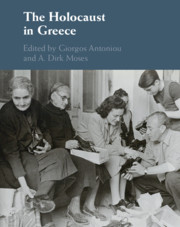Book contents
- The Holocaust in Greece
- The Holocaust in Greece
- Copyright page
- Contents
- Figures and Maps
- Tables
- Contributors
- Preface
- Introduction: The Holocaust in Greece
- I Perpetrators
- II Collaborators and Victims
- III The Question of Property
- IV The Aftermath: Survival, Restitution, Memory
- 11 “New Men vs Old Jews”: Greek Jewry in the Wake of the Shoah, 1945–1947
- 12 “You are Your Brother’s Keeper”: Rebuilding the Jewish Community of Salonica from Afar
- 13 Being a Holocaust Survivor in Greece: Narratives of the Postwar Period, 1944–1953
- 14 Bodies Visible and Invisible: The Erasure of the Jewish Cemetery in the Life of Modern Thessaloniki
- Epilogue
- Index
11 - “New Men vs Old Jews”: Greek Jewry in the Wake of the Shoah, 1945–1947
from IV - The Aftermath: Survival, Restitution, Memory
Published online by Cambridge University Press: 26 October 2018
- The Holocaust in Greece
- The Holocaust in Greece
- Copyright page
- Contents
- Figures and Maps
- Tables
- Contributors
- Preface
- Introduction: The Holocaust in Greece
- I Perpetrators
- II Collaborators and Victims
- III The Question of Property
- IV The Aftermath: Survival, Restitution, Memory
- 11 “New Men vs Old Jews”: Greek Jewry in the Wake of the Shoah, 1945–1947
- 12 “You are Your Brother’s Keeper”: Rebuilding the Jewish Community of Salonica from Afar
- 13 Being a Holocaust Survivor in Greece: Narratives of the Postwar Period, 1944–1953
- 14 Bodies Visible and Invisible: The Erasure of the Jewish Cemetery in the Life of Modern Thessaloniki
- Epilogue
- Index
Summary
- Type
- Chapter
- Information
- The Holocaust in Greece , pp. 255 - 272Publisher: Cambridge University PressPrint publication year: 2018
- 1
- Cited by



